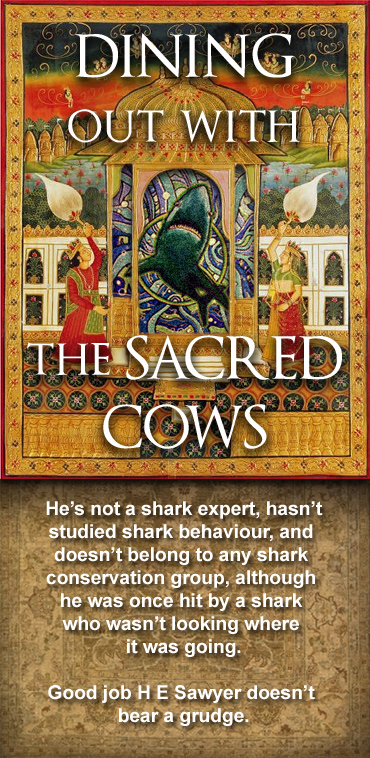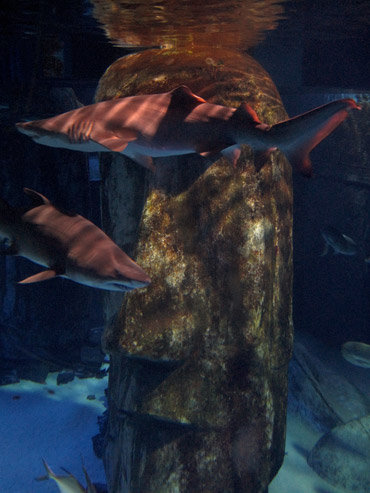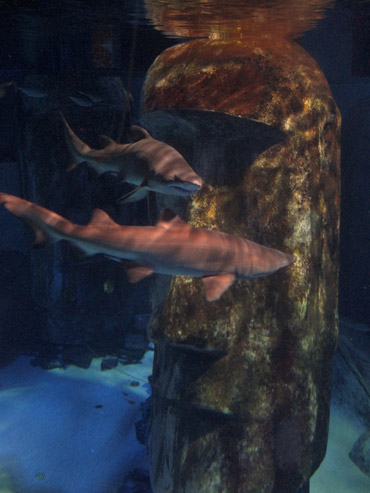
choose an article
|
||
In the beginning, the day after I’d passed my Open Water, and become one of you lot, I bumped into the assistant instructor in the bar. Free of newbies, he’d been out doing proper diving. “We saw a sh - - Sh! - - SH! - - SHARK!” He wasn’t scared, or cold. He just had a speech impediment. Luckily for him I’d missed the boat that day, having been kidnapped by a ruthless gang of papyrus touts. Even back then I knew I was destined to be a Jonah, and nobody would see anything decent with me for a buddy. But I did wonder what it would be like to encounter a shark without a sheet of plate glass between us. I didn’t go looking for them specifically, and figured it would just be a matter of time. Three years later I finally saw not one, but two, resting on the seabed. Biggest anticlimax of my diving life. Now I’m sorry, but I don’t care about sharks. I never have, and I never will. They’re OK on a T-shirt, but even then I don’t get a buzz when a percentage goes towards their well-being, because I care about shark conservationists even less. No doubt the feeling’s mutual. By tonight I’ll be suspended over water, my forearm dripping blood, while a convenient henchman raises the door of the shark tunnel. They probably haven’t even had the decency to tie Jane Seymour up with me. There’s a sense that, because I dive, I’m expected to sign up for sharks. Maybe that’s because if shark activists can’t count on divers, who can they count on? I’ve been considering this diver-shark shark-diver relationship ever since a ‘discussion’ I had last year, with a Scandinavian in a tinpot airport, waiting for planes that would inevitably never arrive. We performed that ritual, where lone travellers thrown together have a seemingly civil conversation, while surreptitiously trying to trump each other with their exploits. A little bit further. A little bit deeper. A little bit - dysfunctional? Then I mentioned how I wouldn’t mind an ‘interactive’ dive to watch sharks feed. That did it. I got the lecture. In summary, feeding changed shark behaviour, he was a marine biologist, therefore he knew!! (He definitely used two exclamation marks.) One of us was standing his ground, and one of us wasn’t, because thankfully my flight was boarding.
There are polarised views on the subject of shark feeding. Conservationists in one corner, financially interested parties in the other. The rank and file pick sides, then there’s an ideological punch up, and although I don’t give a monkey’s about sharks, I don’t want to miss out on the opportunity to goad everyone else on. No contest? I can’t find a single marine conservation group that thinks feeding is a good idea. Most suggest it changes behaviour, distribution, feeding patterns, and the nature of the shark’s contact with man. Instead of patrolling a large habitat for food, sharks may, as a result of organised feeds, stay in one relatively small location, and in closer proximity to more of its own species than would otherwise occur. Anti-feeders worry sharks will become dependent on ‘hand outs’, and may not put the same effort into hunting prey when they have a dependable food source. Conservationists also fear illegal shark fishing could take place at shark feed sites, once the diving audience have left for the day. In 2001, the Florida Fish and Wildlife Conservation Commission introduced an outright ban on feeding marine life, after a group of divers, (the Marine Safety Group), lobbied for action, having experienced an increase of intrusive sharks expecting food on their dives. There were growing concerns that the feeding and baiting of sharks, by dive operators and photographers, was leading to an increase in shark attacks, although since the ban incidents have continued. But in February 2008, the first diver was killed on an interactive shark feed in the Bahamas. The charter boat operator had moved there from Florida to avoid the ban. Of course shark attacks of any description are rare; “You are more likely to be struck by lightning than attacked by a shark.” Obviously. Because on this planet, (Earth), there’s far more people exposed to the possibility of being struck by lightning, than being bitten by a shark, at any given time. Truth is, while we paddle, swim, surf, dive, capsize, or wade across the Zambezi, we’ll have incidents. And regardless of the risks, divers will want to experience sharks, although conservationists maintain actual encounters are not a prerequisite to encourage shark protection. They claim most divers would prefer genuine interaction over a circus act anyway. Dermot Keane of Sam’s Tours, and founder of the Palau Shark Sanctuary agrees; “Sam’s Tours fully supports Koror State’s ban on shark-feeding as it not only endangers divers and snorkelers but also interferes with the sharks natural survival behaviour. One of the beauties in diving Palau is that it’s almost guaranteed to see sharks on every dive! There is no need to feed sharks in Palau.” (1) The Palau Shark Sanctuary was formed in 2001 to stop the finning and poaching of sharks, and with political assistance they’ve protected their greatest natural resource. Dermot is a lovely bloke, a true Patron Saint of Sharks, to be sure. But it’s easier to take the moral high ground when your desk is less than an hour from “Blue Corner”, and several other sites, where you’re “almost guaranteed” to see sharks under natural conditions. Very few destinations have that luxury. Incidentally there’s a PADI ‘Blue Corner’ Diver Distinctive Speciality Course, if you are interested. And opponents say PADI only supports shark feeding because it wants to sell PADI speciality shark diving courses ... And before we leave Palau, remember you can also join Dr Erich Ritter, who hosts his SharkSchool™ week with Sam’s Tours. He’s the shark behaviourist who was badly bitten by a bull shark, having chummed the shallows in an ‘experiment’ to show Nigel Marven and the Discovery Channel that sharks aren’t interested in humans, even when there’s food in the water. Remember, that was an ‘experiment’, not an attempt to orchestrate shark behaviour for the cameras. So what are the arguments for feeding sharks? For starters PADI and DEMA, (Diving Equipment and Marketing Association), support operators who offer shark interaction, whether feeding is on the menu or not. But they opposed the Florida ban. Why? They say because shark shows generate tourist revenue, which boosts the local economy, so consequently the shark is worth more as a live performer, than fished and dead. Opponents say sharks bring tourism, whether they’re fed or not. But ultimately doesn’t it depend on how big the shark is in the viewfinder as to whether you’ll return, rave and recommend? This may be how some underwater professionals become pragmatic about the need to bait sharks for a close up. A grainy image twenty meters away just isn’t going to cut it, and magazines aren’t shy when it comes to putting glossy sharks on the cover. There’s the belief that close encounters promote conservation and education. Those who are indifferent, sceptical, or fearful towards sharks have the opportunity to experience them first hand, and in turn will hopefully give good word-of-mouth and support the cause. Although whether those who are genuinely fearful will volunteer for a shark dive as part of their ‘therapy’ is debatable. |
published in Diver (UK) Arguably the industry leader in shark feeding tours is Stuart Cove of the Bahamas. “Click Here to Experience The World’s Most Exciting Underwater Adventures.” So I did. It’s all Hollywood teeth and Day-Glo Technicolor, and I see why critics use a dismissive ‘theme-park’ tag for the experience. But I was a fan of H R Pufnstuf, and so was Kurt Cobain. But Stuart Cove believes they’ve learned a lot about sharks in a relatively short amount of time, due to the opportunities close observation affords, including which food sharks prefer, because given a choice, sharks express a preference. They make the point that other than supplying a dependable food source, they do nothing to modify shark behaviour. Of course the food source itself is the issue. And when I emailed Stuart Cove to ask what other scientific discoveries they had made as a result of their interactions? Stoney Cove silence. I suspect most divers tempted by interaction will have one shark feed dive, buy the DVD, which they’ll nonchalantly show their non-diving friends, (who will be suitably impressed, unlike they were with, ‘The Wrecks of Scapa Flow’), and if, in retrospect, there’s guilt, it’s no worse than having Spandau Ballet in your record collection. Those against shark feeds will frown at this, but it’s not illegal to own Spandau Ballet. Just to play them. (I keep their second album hidden under the pornography.) Shark divers opposed to Stuart Cove and controlled feeds won’t really care anyway, not when they’re enjoying natural encounter expeditions. They sell raffle tickets in aid of sharks, but first prize isn’t a berth on their boat. Last thing they want is a repeat of the Red Sea, where hordes of divers have already impacted on the shark’s traditional habitat, sending them further south, changing their behaviour. Orchestrated shark dives serve a practical purpose. Of controlling the number of shark divers in the wild. There’s no scientific consensus regarding behaviour modification as a result of feeding, although you sense that’s just around the corner. According to PADI and DEMA, numerous scientists do not endorse the idea that feeding experiences are harmful. But harmful to sharks, us, or both? The death of the French tourist snorkelling at St. John’s reef in The Red Sea in 2009, although it occurred during a natural encounter, was immediately linked to a suspicion of illegal feeding in the area. The HEPCA (Hurghada Environmental Protection and Conservation Association) statement referred to the practice of shark feeding in the Caribbean, in connection with the St. John’s incident, for apparently no other reason than to imply that the Red Sea was ecologically responsible. And the Caribbean was not. (2) They probably didn’t want to lose business as a result of a shark fatality, and took the opportunity to point the finger at the competition. I don’t know, I’m just guessing. How the effects of feeding sharks will play out long term is at present uncertain. Sharks are difficult to study as they’re free ranging, although this contradicts the fear that they’re simply circling man-made auditoriums until showtime. Dr. George Burgess, director of the International Shark Attack File in Florida, opposes feeding. “They (sharks) lose their natural caution around human beings. For the same reason on land you don’t feed alligators or bears.” (3) Now I’ve seen sharks and bears in the wild, and trust me on this, they’re completely different. For starters there’s nothing to stop a hungry bear bowling down the main drag of Mariposa looking for food, whereas I think we can be confident a shark is not going to come thrashing up the beach at Nassau after barbecued tourists. If you stay out of the water you are never going to have any problems with a shark - unless you are into taxidermy. Apparently they’re a so-and-so to stuff. Comparing a shark to a bear is like comparing sharks and bears to birds. We feed birds, changing their behaviour, bringing them to our gardens. Birds are literally our canary in a coal mine. They give us an accurate visible reading on the health of our environment, in a way sharks and bears cannot. We rip up hedgerows, fortify our towns and cities with nine inch nails, domesticate cats, and spray pesticides. They control insects, rodents, and distribute seeds. And although they don’t do it for our benefit, they sing their bleeding hearts out. With the blessing of arguably the UK’s most successful conservationists, the Royal Society for the Protection of Birds, I can learn how to entice different species to my garden by providing a variety of sustainable foods in a range of different bird feeders. I can learn how much to feed, when to feed, and the importance of feeding hygiene. The British have been feeding birds since the newspapers suggested it during the harsh winter of 1890 - 91. Within ten years bird feeding was considered a national pastime. It’s now one of the fastest growing activities in America, where fifty five million people, 18% of the population, regularly feed birds. Yet remarkably, despite feeding birds in my garden for twenty years, they still fly away when I open the door. The starlings regroup on the chimney pots to slag me off. Feeding has not changed their behaviour to the extent that they’ve abandoned self preservation. Or self sufficiency when I go on holiday, for that matter. I’m not suggesting that what applies to birds will apply to sharks, but if the reason for not feeding sharks relies on the comparison with bears, then we need more research and a new approach. Everyone, including the US Park Service, maintains wild creatures should not be fed, but no one mentions birds, and their symbiotic relationship with us, which is solely on their terms. The possibility that the same might be true of sharks could at least be be explored.
Ah, I know what you’re going to say. Sharks, (and bears), can kill you, and birds can’t. Although according to the World Health Organisation, H5N1, (the viral strain of bird flu), has killed more than 250 people since the first human cases in 2003. Twenty six of those deaths were in Egypt. According to the International Shark Attack Files, there’s been 464 deaths. Since 1958. So it transpires it’s not as risky diving with sharks, ‘tamed’ or otherwise, as it is being sneezed on by a duck in Kowloon. Unless you’re going to let testosterone suggest that dying from a bird-bug somehow isn’t as statistically worthy as being ripped limb from limb by a man-eater? In nature the prey outnumbers the predator, although shark conservation groups are hardly rare. Maybe it’s the glamour associated with apex predators, but there’s not the same high profile attached to rarer species, some turtles for example, who are lower down the food chain, yet part of the shark’s natural diet. Let’s hope that if sharks survive, they won’t have to rely on hand outs, because activists were so busy saving sharks it was at the expense of what sharks are intending to eat. I’m not sure what the Marine Safety Group were doing when they suddenly had their “Woah!! Jesus!!” moment, (I read somewhere that they were spear fishing), but I’d suggest their actions were initially motivated by self preservation, rather than shark protection. As a result, has shark feeding become an excuse for one group to browbeat the rest of us? Sharks have been around for 400 million years, so there’s no need to patronise them. They were outwitting sea monsters long before we evolved, and chances are they’ll be swimming the oceans long after we’ve gone. They’re not doe-eyed orang-utans, clinging on for dear life in a diminishing jungle. A convenient 100 million sharks are killed annually, so playing Devil’s Advocate, they must be doing something right for there to be 100 million to kill every year. Personally I’d rather see 93 million sharks killed next year, providing we know if that’s due to sharks, a) becoming rarer, or b) legislation has been implemented and enforced to reduce the catch. Trumpeting 100 million shark kills, year in, year out, serves no purpose other than to provide easy propaganda that’s ultimately counterproductive. If feeding changes shark behaviour, because it suits the shark, they might survive, even thrive as a result. There’s no point waiting around for mankind, because it’s highly unlikely we’ll change our behaviour before it is too late. Blue fin tuna anyone? The shark simply cannot trust us to do the right thing. Not that it ever has, or that it ever will. I’m no expert in shark behaviour, but I suspect they don’t give a monkey’s.
(1). sam’s tours blog (09/19/07) (2). (04/06/09) |


